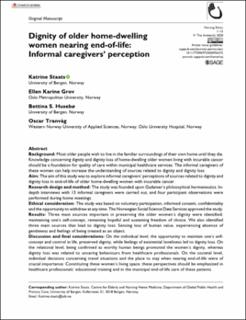| dc.description.abstract | Background: Most older people wish to live in the familiar surroundings of their own home until they die. Knowledge concerning dignity and dignity loss of home-dwelling older women living with incurable cancer should be a foundation for quality of care within municipal healthcare services. The informal caregivers of these women can help increase the understanding of sources related to dignity and dignity loss
Aim: The aim of this study was to explore informal caregivers’ perceptions of sources related to dignity and dignity loss in end-of-life of older home-dwelling women with incurable cancer.
Research design and method: The study was founded upon Gadamer’s philosophical hermeneutics. In-depth interviews with 13 informal caregivers were carried out, and four participant observations were performed during home meetings.
Ethical consideration: The study was based on voluntary participation, informed consent, confidentiality and the opportunity to withdraw at any time. The Norwegian Social Science Data Services approved the study.
Results: Three main sources important in preserving the older women’s dignity were identified: maintaining one’s self-concept, remaining hopeful and sustaining freedom of choice. We also identified three main sources that lead to dignity loss: Sensing loss of human value, experiencing absence of gentleness and feelings of being treated as an object.
Discussion and final considerations: On the individual level, the opportunity to maintain one’s self-concept and control in life, preserved dignity, while feelings of existential loneliness led to dignity loss. On the relational level, being confirmed as worthy human beings promoted the women’s dignity, whereas dignity loss was related to uncaring behaviours from healthcare professionals. On the societal level, individual decisions concerning travel situations and the place to stay when nearing end-of-life were of crucial importance. Constituting these women’s living space, these perspectives should be emphasized in healthcare professionals’ educational training and in the municipal end-of-life care of these patients. | en_US |

